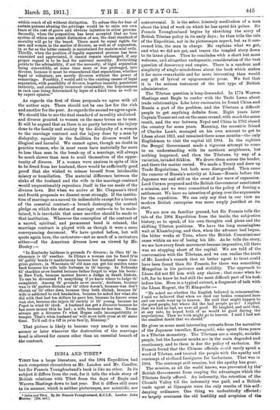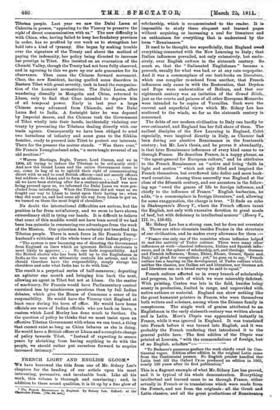INDIA AND TIBET.*
TIBET has a large literature, and the 1904 Expedition had such competent chroniclers as Mr. Landon and Mr. Candler, but Sir Francis Younghusband's book is like no other. In its subject it differs from the rest, for it tells the whole story of British relations with Tibet from the days of Bogle and Warren Hastings down to last year. But it differs still more in its manner, which is neither picturesque, nor scientific, nor • India and Met. By Sir Francis Younghnsbancl, S.C.I.E. London: John SEnrray: [Its. net] controversial. It is the sober, leisurely meditation of a man about the kind of work on which-he has spent his:prime. Sir Francis Younghusband begins by sketching the story Of British Tibetan policy in its early days ; he then tells the tale of the Expedition, not in its picturesque aspect, but as it con• cerned him, the man in charge. He explains what we got,. and what we did not get, and traces the tangled story down , to its latest phase. Then he concludes with a short but most welcome, and altogether undogmatic, consideration of the vast question of democracy and empire. There is a candour an& ■ simplicity of single-mindedness about- the book which makes it far more remarkable and far more interesting than would any gift of lyrical or epigrammatic prose. We feel that • it is the serious testament of the best type of British administrator.
The Tibetan question is long-descended. In 1774 Warren.' Hastings sent Bogle to confer with the Tashi Lama about trade relationships. Like later emissaries, he found China and . Russia a part of the problem, and the Tibetans a difficult people to get anything definite from.. Eight years later Captain Turner set out on the same errand, with much the same • result, and the war between Nepal and China in 1792 closed • the country for some years. Manning, the eccentric friend of Charles Lamb, managed on his own account to get to: Lhasa about 1811, and remained there some months—the only 7 Englishman to visit the capital till 1904. In the eighties. the Bengal Government made a vigorous attempt to come to an understanding with its northern neighbours, but nothing happened, and then the Tibetans, by way of a • variation, invaded Sikkim. We drove them across the border, and there the matter rested. We made a Treaty and drew up: Trade Regulations, but both were disregarded. Then came: the rumour of Russia's activity at Lhasa—Russia before the Japanese war and still on the crest of her wave of expansion.: Lord Curzon proposed and the British Government sanctioned:
a mission, and we were committed to the policy of forcing a settlement. We have no intention of going over the arguments for the expedition. We can only say that in our view no modern British enterprise was more amply justified at its start.
We are now on familiar ground, but Sir Francis tells the: tale of the 1904 Expedition from the inside, the subjective. history, so to speak, of his own thoughts and plans and the' shifting Tibetan positions. We have the long meaningless wait at Khambajong, and then, when the advance had begun,. the bitter weeks at Tuna, where the British Commissioner' came within an ace of losing his life. As he tells the story,: we see bow every fresh movement became imperative, till there was no stopping short of the capital. We are told of the conversation with the Tibetans, and we can realise the truth. of Mr. Landon's remark that no better agent to treat could , have been found than Sir Francis, for there was something. Mongolian in his patience and stolidity. The approach to: Lhasa did not fill him with any elation ; that came when he: left, for he knew he had still the most difficult part of his task: before him. Here is a typical extract, a fragment of talk with the Lhasa Regent, the Ti Rimpoche :- "He asked me whether the English believed in reincarnation.' I said we believed that when we died our bodies remained here and our souls went up to heaven. He said that might happen to the good people, but where did the bad people go to ? I replied that we had no bad, we were all good. He laughed, and said that, at any rate, he hoped both of us would be good during the negotiations. Then we both might go to heaven. I said I had not the smallest doubt that we should."
He gives us some most interesting extracts from the narrative• of the Japanese traveller, Kawaguchi, who spent three years in a. Tibetan monastery. The Tibetans are a simple, sociable
people, but the Lamaist monks are in the main degraded and reactionary, and to them is due the policy of exclusion. Sir:
Francis found that the Chinese officials could rarely speak a. word of Tibetan, and treated the people with the apathy and
contempt of civilised foreigners for barbarians. That was in 1904. The contempt still remains, but the apathy has gone. The mission, as all the world knows, was prevented by the
British Government from reaping the advantages which the, Tibetans freely offered. An indemnity, the retention of the.
Chumbi Valley till the indemnity was paid, and a British• trade agent at Gyangste were the only results of this self-: denying ordinance. One thing we undoubtedly effected :- we largely overcame the old hostility and anaiiloion of the , . Tibetan people. Last year we saw the Dalai Lama at Calcutta in person, "appealing to the Viceroy to preserve the nigh of direct communication with us." The new difficulty is with China, who, having failed to keep her feudatory province in order, has so profited by our work as to strengthen her hold into a kind of tyranny. She began by making trouble over the signature of the Treaty and about the method of paying the indemnity, her policy being directed to increase her prestige in Tibet. She insisted on an evacuation of the Chumbi Valley; though the Treaty had not been fully observed, and in agreeing to this we gave up our sole guarantee for its observance. Then came the Chinese forward movement. Chao, the new Resident, having quelled some disorders in Eastern- Tibet with great severity, took in hand the reorganisa- tion of the Lamaist monasteries. The Dalai Lama, after wandering dismally" in Mongolia- and China, returned to Lhasa, only to find that Chao intended to deprive him of all temporal power. Early in last year a large Chinese army advanced from Chiamdo, and the Dalai Lama fled to India. A fortnight later he was deposed by. Imperial decree, and the Chinese took the Government of Tibet wholly into their hands, incidentally violating our treaty by preventing the Tibetans dealing directly with our trade agents. Consequently we have been obliged to send two battalions of infantry and some guns to the Sikkim frontier, ready to proceed into Tibet to protect our interests. There for the present the matter stands. " Was there ever," Sir Francis Younghusband asks, "a more tragic reversal of an old position ? "
"Warren Hastings, Bogle, Turner, Lord Curzon, and we in 1904, all trying to induce the Tibetans to be ordinarily civil ! And now the Grand Lama and the entire Government come to ...us come to beg of us to uphold their right of communicating direct with us and to send British officers—and not merely officers but soldiers—to Lhasa and to form an alliance Yet when all we have been striving after for a century-and-a-half was now ;being pressed upon us, we informed the Dalai Lama we were pre- cluded from interfering. When the Tibetans did not want us we fought our way to Lhasa to insist upon their having us ; when they did want us, and had come all the way from Lhasa to get us, we turned on them the most frigid of shoulders."
No doubt the international difficulties are serious, but the position is far from satisfactory, and we seem to have shown extrordinary skill in tying our bands. It is difficult to believe that some of this muddle would not have been saved if we bad been less quixotic in renouncing our advantages from the work of the Mission. Our quixotism has certainly not benefited the Tibetan people. There is much force in Sir Francis Young- husband's criticism of the whole tenor of our Indian policy —
"The system is now becoming one of directing the Government from England on lines which an ignorant British electorate is most likely to approve.'. . . No one feels responsibility. And the British elector who has been held up to the Englishman in India as the man who ultimately controls his actions, and who should therefore have the responsibility, simply shrugs his shoulders and asks what India has to do with him."
The result is .a perpetual series of half-measures ; deporting 'en agitator one month and bringing him back the next, allowing an agent in Tibet but not at Lhasa. On the matter of machinery, Sir Francis would have Parliamentary control exercised leas by-mischievous questions than by full Indian debates, which give the House of Commons a sense of its responsibility. He would have the Viceroy visit England at least once during bis term of office. He would have home officials see more of. Indian officials who are back on leave, a custom which Lord Morley has done much to further. On the question of policy he thinks that we must insist upon an effective Tibetan Government with whom we can treat, a thing that cannot exist so long as China behaves as she is doing. He would, have a British officer at .Lhasa and a complete change
of policy towards Tibet. " Instead of expecting to secure peace. by shrinking from having anything to do with the people, we should rather put ourselves forward to acquire increased intimacy." . .











































 Previous page
Previous page